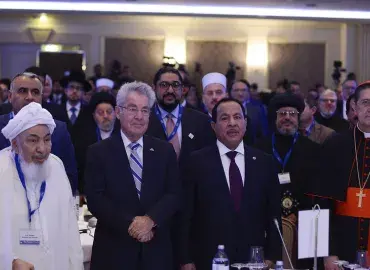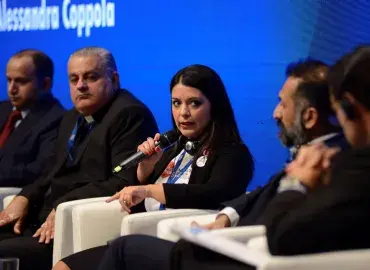
On October 30 and 31, KAICIID will convene more than 150 faith leaders, policymakers, state actors, civil society and human rights representatives, journalists, educators, and dialogue practitioners in Vienna to discuss ways of recognising and fighting the growing global phenomenon of hate speech.
The international conference entitled, “The Power of Words: The Role of Religion, Media and Policy in Countering Hate Speech” comes at a time when the phenomenon is disrupting social cohesion, undermining pluralism, and destroying lives around the world.
The bulk of the religious leaders attending will be from the Arab region, where KAICIID administers and supports interreligious dialogue programmes. But European experts on social media and hate speech and the challenges presented by so-called “fake news” will also be taking part.
“In the Arab world, hate speech not only isolates minorities; it’s a matter of life and death,” said Waseem Haddad, Senior Programme Manager for KAICIID’s Arab Region Programme.
“Religiously and politically motivated hate speech presents a huge danger, often leading to violence against marginalised groups. At KAICIID we are discussing how faith leaders can work together with policymakers and media to counter hate speech, prevent incitement to violence, and promote peaceful coexistence.”
“Hate speech, wherever it occurs, promotes prejudice, exclusion, and discrimination,” said Professor Mohammed Abu-Nimer, Senior Adviser to KAICIID. “In Europe and elsewhere, we’ve seen a rise in political populism and targeted hate speech against refugees, foreigners, and different minority groups, including Muslims and Jews. In the Arab region, ISIS and Al Qaeda have deployed dangerous discourse across social media and religious media networks, targeting people who disagree with their theology. We need to develop positive public narratives that counter this hatred and incitement to violence.”
KAICIID supports hundreds of initiatives and social media campaigns doing just that -- promoting interreligious cooperation, peacebuilding, diversity, and inclusion over hatred and violence. This conference will identify lessons learned and recognise some of the high-level religious leaders and grassroots dialogue practitioners working tirelessly to promote peace.
“The idea is not to just come and deliver speeches but to identify gaps, share best practices, and see how representatives from the policy, education, media, and religious sectors can work together to develop an action plan that brings about real change,” Haddad said.
Since its ground-breaking United Against Violence in the Name of Religion conference five years ago, KAICIID’s efforts to counter hate speech have included Social Media as Space for Dialogue trainings, which have equipped hundreds of civil society activists and religious actors with skills to promote peace online; Dialogue Week campaigns, which create impactful online outreach initiatives in the Arab region; and the Interreligious Platform for Dialogue and Cooperation in the Arab World, which supports religious authorities from Muslim and Christian institutions to advocate the fundamental rights and inclusion of marginalised communities.
KAICIID’s microgrant program also helps fund grassroots initiatives which counter hate speech in the Arab region, Europe, the Central African Republic (CAR), Nigeria and Myanmar. Projects include trainings in conflict sensitive journalism and the establishment of early warning/response systems.
In Europe, the Centre is working to counter xenophobic hate speech against migrants and refugees fleeing persecution and other hardships and has supported the Muslim Jewish Leadership Council, which works to counter Islamophobia and Antisemitism.
In CAR and Nigeria, KAICIID is establishing interreligious and intercultural dialogue spaces to help dismantle stereotypes among Christians and Muslims while also supporting local initiatives to combat hate speech and incitement to violence.
In Myanmar, the Centre is connecting religious leaders with peace activists and journalists to replace hate speech with accurate facts. KAICIID field expert Harry Myo Lin also teaches leaders to harness social media platforms for good, in order to combat the spread of harmful rumour-mongering and misinformation.
On the global level, KAICIID has partnered with the UN Office for Genocide Prevention and Responsibility to Protect to launch the Plan of Action for Religious Leaders and Actors to Prevent Incitement to Violence that could lead to Atrocity Crimes. Launched at the UN in 2017, the Plan of Action was developed in response to an alarming spike in hate speech and provides regional strategies for religious leaders to combat violence and sectarianism.
In all of these contexts, Abu-Nimer says too many people lack safe spaces where they can come together and talk about their different religious and cultural backgrounds. KAICIID is creating such spaces and using dialogue tools to help diverse groups discover shared values, challenge misperceptions, and ultimately work together.
One critical question Abu-Nimer and Haddad expect will emerge during the conference is how governments and peace practitioners can strike the delicate balance between quashing dangerous hate speech and protecting people’s fundamental right to freedom of expression.
“This is always the tricky part, and it’s one reason we’re inviting media to join the conference,” said Abu-Nimer. “If a statement is hate speech but falls short of inciting violence, we should counter it with better speech and preventative measures such as advocacy, education, and dialogue.”
Haddad sees this not as a suggestion but as a mandate we must heed to ensure peace.
“Radical groups use social media to spread hate speech. It’s time for religious institutions to use it to advocate for inclusion and spread a culture of dialogue,” he said.
VIENNA, 31 October 2019 - Faisal bin Muammaar, Secretary General of the International Dialogue Centre (KAICIID)…
Alessandra Coppola is a political scientist, board member of the No Hate Speech Network and the vice-coordinator…
VIENNA, 28 October 2019 - More than 190 international delegates and guests, among them Heinz Fischer, former President of…



